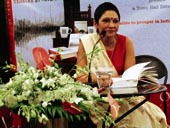 |
| Madhu Trehan reads from her book during its launch at a city bookstore. (Sudeshna Banerjee) |
A child put a five-rupee coin on his teacher’s desk and said: “I want my seat changed”. A colleague of the shocked teacher shared the incident with the gathering at Oxford Bookstore. It fitted with the mood. Madhu Trehan had just read excerpts from her book Prism me a Lie, Tell me a Truth – Tehelka as Metaphor.
The book focuses on Operation West End, an undercover project by the website Tehelka in 2001 to expose bribing of army officers and senior political leaders in an arms deal. For six years, Trehan analysed the imperatives at the root of the scandal and how the system chillingly got back, by obfuscating the case and using the instruments of democracy to crush the website and its investors.
The discussion that interspersed Trehan’s readings veered round the topic: “Is it possible to prosper in India if you are honest?” Trehan showed G. Vahanvati, the advocate-general of Maharashtra, breaking down on tape as he spoke about why he refused to appear for the case midway.
First Global Stockbroking, the investor funding Tehelka that had 300 offices and 800 people, was by then reduced to one office and two people.
Corruption was the evening’s keynote. “When Indira Gandhi drew up income tax rates, almost Rs 99 of every Rs 100 that people earned were being take away, forcing them to fudge figures. Now taxes are reasonable, but dodging taxes has become a habit,” said Trehan .
In a search for the first high-profile case, a member of the audience recalled an earlier arms deal scam involving Dharam Teja. Trehan rewound to the Raj era when a Congress worker kept aside money collected for the party. He returned it only after a shakedown by Gandhiji himself. Someone remembered Mir Zafar who was bought over by the British even earlier.
But corruption is also a daily habit. “Stopping at a red light in India is optional,” Trehan pointed out.
A Britisher in the audience offered that Indians were more honest about being corrupt, naming Mayawati as a favourite, provoking titters all around.
“Americans have to think and plot how to lie. To us, it comes naturally,” added another, taking up the self-congratulatory thread.
But these were the only light moments in an evening of introspection, something that the book has done through the prism of a single case.
London letters
From the 1700s, The London Magazine has brought the best of the writers of English literature to its reading public. Founded in 1732, the magazine appeared for 53 years as a counterbalance to The Gentleman’s Magazine.
Re-launched in 1820 under John Scott’s editorship, The London Magazine championed the works of Wordsworth, Lamb, De Quincey and Clare, as well as the ‘Cockney School’ of poets.
Welcoming the publication under John Lehmann’s editorship, T.S. Eliot said, “the magazine which will boldly assume the existence of a public interested in serious literature”.
The London Magazine is now available in Calcutta as its latest edition was launched in the city on February 24 by British deputy high commissioner Simon Wilson.
Christopher Arkell, who purchased the magazine in 2001, continues to be its publisher. Arkell, who lives in London and published his first book of poetry, State of Affairs, in 1979, spoke about the ethos of the magazine while Papia Ghoshal, the international editor, read out a poem of Sankha Ghosh in the Bengali and English versions.
Ghoshal curated the magazine’s first Anglo-Indian edition. Actor Arjun Chakraborty, a long time associate of poet and lyricist Gulzar, read out his poems.
The event was a part of British Council’s literature programme, India ’09: Through Fresh Eyes, which aims to highlight the Indian market focus at London Book Fair 2009.










